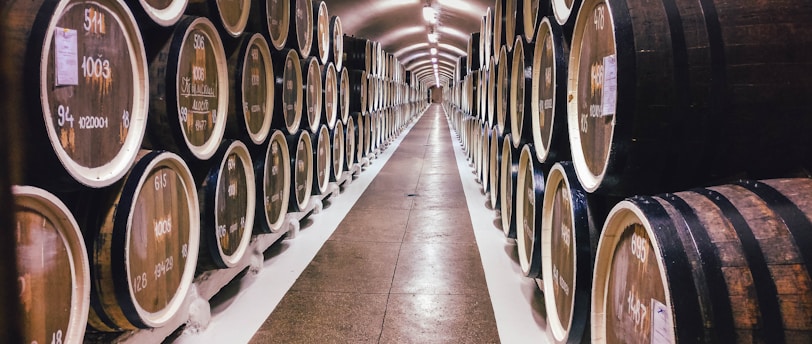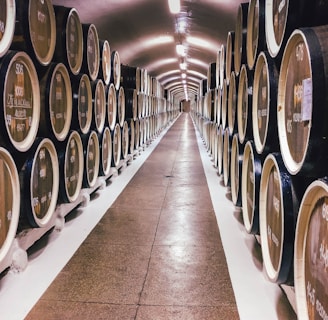Six Beliefs every winery should leave in 2023
Faye Cardwell
1/5/20244 min read


2023 was, as Jancis Robinson confirmed in her column in the FT shortly before Christmas, a tough year for the wine industry. Demand is decreasing as consumers look to drink less and better - or in some cases, no more alcohol at all, and competition is fierce. Even in regions with hundreds of wineries, new wineries spring up almost weekly, lured by seemingly higher returns from the prices offered by the bottom-shelf cooperatives.
In this blog post I've highlighted five beliefs that I hear that need to stay in the post in order to at least survive in the competitive wine market of 2024.
1. I only want to talk to Importers
I get it. While securing partnerships with importers that are hopefully going to take at least a half-pallet out of your cellar, is time-efficient, let's not forget about the people who are actually drinking your wines.
They might not understand the intricacies of your wine-making process, but they don't need to to know that you're making great wine. Also, you never know who who's know nowadays. Someone may look like they know nothing about wine (and love yours) but they may also have a sister-in-law/best friend etc who's just set up a wine-shop/pizzeria/florists and is looking for wines for their new retail operation. You might be in a market where that won't help and you still need an importer but still, perhaps they're planning a wedding or a corporate event and your winery would be the perfect location? Sometimes sales come from the strangest places and through the most convoluted connections.
2. My Importer Isn't Selling Enough Wine
Let's be honest, no-one is selling enough wine. It's difficult everywhere and for everyone. I've heard from wineries that registered decreases in sales for the first time in a decade last year. It might seem like your importer isn't working but try to understand the climate they are operating in and understand how you can support them in that. Have you visited them recently? Have you provided them with marketing materials they can use in their presentations? Are you giving them updates about what is happening in the winery? Scores or other? Is the economy they're operating in in recession? Do you have different products that might be more suitable for them? If they have lower sales of your wines there's a good chance that visits from any suppliers will be down making it the best time for you to get ahead and add value.
A relationship with a winery should long and two-directional. If your importer has it's own wine shop or retail space, providing more information and even training the staff when you visit will go towards helping them sell more wine. The more they know, the more they can talk about and the more they will sell. Take a proactive approach by regularly communicating with your importer, providing them with marketing materials and product updates, and collaborating on promotional initiatives. By working together as partners, you can optimize your sales efforts and achieve better results.
3. I need a National Distributor
While having a national distributor may seem like a desirable goal, it reminds me of the "don't put all your eggs in one basket" saying. National distributors often prioritize larger wineries with established brands, making it challenging for smaller wineries to stand out. I
Building strong relationships with different localised distributors and wine shops may provide a better strategy. They'll avoid eating each other's market and you'll be able to give them more personalised attention and tailored marketing strategies.
4. I don't offer Winery visits
Either you have a brand so big you'd have the world knocking down your door, or you need to find a way to open to winery visits. People want to know and understand what they are consuming and where it came from and wine is no different.
Tours don't have to be long, complicated or available every day. Knowing that a couple of times a week you would have availability and making that visible on your website (see my post about 12 elements every website should include) is enough. Perhaps you feel like there's not much to see (professionals are happy with a wooden table, a sample from the barrel and an old bottle they can't taste with their local importer) but anything is better than nothing. Wine is about charm, place and people. Bring them together and it doesn't matter how elaborate your facilities are, you'll win just with an authentic experience.
5. My Website isn't what sells my wine
While the quality of your wine is undoubtedly crucial, neglecting the importance of a well-designed and user-friendly website and well-curated social media channels is just another front you are not winning on. The guy down the road may not have the quality of wine you do but if you do not have a holistic approach to how you market it, you'll make it harder for yourself.
Your website is not only where professionals and consumers can access information about your wine, it is your platform for engaging with potential customers, sharing your winery's story, and promoting events and offers. If you need help with that, let me know. I offer a 90 minute communication audit where I analyse your website and your social media channels and put together a strategy for you to optimise them.
6. Low or no-Alcohol? Never..
Like it or not, alcohol is turning into the baddy and the fastest growing sector in the market is for low and no-alcohol products. Up to now removing alcohol has meant removing body, depth and any trace of terroir, but there will be developments. Technology will change and there may even be other ideas, outside your usual range that could be added to your selection. Small wineries will always remain focused on traditional wines, however adding a low or no product into your line, already changes your appeal to people who have decided against alcohol.
In 2024 wineries will have to offer way more than wine and think outside the box to survive. Emphais should be on offering experiences that connects people to their land, that brings them closer to understanding how wine is made and the particularities of the area. Telling stories that perhaps even aren't your own but creating a link to your region that will remain.
